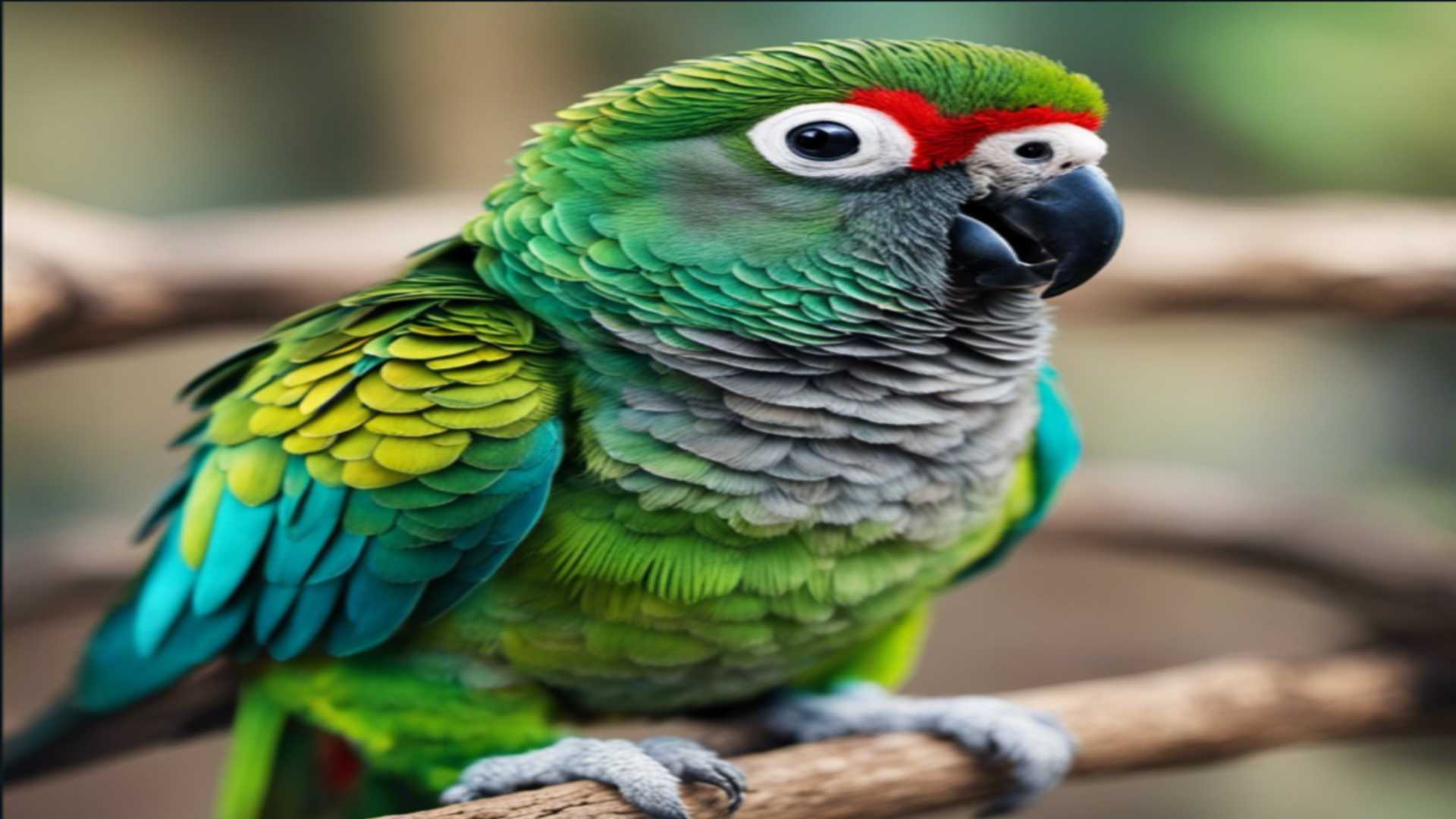Conures need plenty of exercises, and if they don’t get it, they can become restless and destructive. If you’re the owner of a conure or you’re thinking of getting a conure, then you might be wondering: how often should a conure be out of the cage?
As a general rule, conures need at least an hour out of their cage each day. This gives them time to stretch their wings and explore their surroundings. It is also important to make sure that your bird has plenty of toys and perches to keep it occupied while it is out of the cage.
But how do you know if your Conure is getting enough exercise?
In this article, we will discuss how often a conure should be out of the cage and provide some tips on how to keep your bird entertained.
Let’s get started.
How long should conures be out of their cage?
The recommended time for a conure to be out of its cage is around three hours per day. This gives the bird enough time to explore and play while also getting some exercise.
It’s also important to ensure that your Conure has a variety of toys and objects to chew on and play with inside its cage. This will help keep it entertained and happy while it’s inside.
But what if you can’t let your bird out for that long?
If you cannot let your Conure out of its cage for a full hour each day, it’s still important to give it some time to exercise.
You can place the cage in a room where your bird can fly around and explore. Also, if you have enough space in your garden, then an aviary is a great option for your Conure.
This will give it plenty of room to fly and exercise while you’re not at home.
In fact, many experts believe that an aviary is the best option for a conure, as it provides them with plenty of space to fly and explore.
How to get Conure out of the cage?
There are several ways to get a conure out of its cage.
- One way is to offer it a favorite treat or toy in your hand outside the cage.
- Open the cage door and let the bird fly out on its own. And finally, you can gently scoop the bird up in your hands.
- Place some vegetables or fruit outside the cage for your Conure to access.
- Place a toy or object in the cage that your Conure can play with.
Finally, you can also try gently hand-feeding your Conure. This will get him/her used to being handled and may make it easier to take them out of the cage later on.
What is the ideal size for a Conure bird cage?
When it comes to Conures, cage size is crucial! Conures are highly active birds, and they need enough room in the cage to move around and express themselves. So what would be considered an adequate size?
The ideal minimum size cage for one Conure should measure at least 24’’ wide by 36’’ deep with a height of 48’’ or more.
Bars should be spaced no wider than ½” apart for small birds like Conures – any wider and the bird may escape. Additionally, make sure the cage has plenty of perches and toys.
What if my Conure doesn’t want to come out of the cage?
If your Conure doesn’t want to come out of the cage, there are a few things you can do to try and coax it out.
First, ensure the cage is in a safe, quiet place where the bird can feel secure. Then, try offering it some favorite foods or toys outside the cage.
You can also try gently placing your hand inside the cage for the bird to perch on. If all else fails, you may need to give the birds time to adjust to its new surroundings. Once it feels more comfortable, it will likely start venturing on its own.
If you just bought a conure, it’s best to give it time to adjust to its new home before trying to take it out of the cage.
That’s because it can be pretty stressful for a bird to be in a new environment.
So, give your Conure some time to settle in and get comfortable before you start trying to take it out of the cage.
As you can see, there are a few different things to consider regarding how often a conure should be out of the cage.
How can I keep my Conure entertained while it is in its cage?
Keeping your Conure entertained while it is in its cage is essential for its wellbeing and happiness. Here are some tips to help you keep your bird entertained:
- Provide plenty of toys. Make sure to provide a variety of toys that will stimulate your Conure’s mind and keep it occupied. Toys such as ladders, swings, mirrors, bells, and chewable items are all great options.
- Place the cage in a room with plenty of activity. Placing your Conure’s cage in a room where there is plenty of activity will help keep it entertained and engaged.
- Spend time with your bird. Make sure to spend some quality time with your Conure each day, even if it’s just for a few minutes.
- Provide a variety of perches. Providing your Conure with a variety of perches will help keep it active and engaged.
- Offer treats. Offering your Conure healthy treats is a great way to keep it entertained and motivated.
- Change up the environment. Changing up the environment in your Conure’s cage can help keep it stimulated and interested in its surroundings.
When should I let my bird out of the cage?
In general, most experts recommend letting your bird out of its cage for at least a few hours each day. This will allow it to stretch its wings, explore its surroundings, and get some exercise.
Ideally, you should let your bird out when you’re home and can supervise it. This way, you can make sure that it doesn’t get into any trouble or hurt itself.
If you have other pets in the house, you’ll also want to ensure they’re not bothering or harming the bird.
In fact, as any devoted bird owner knows, our feathered friends need mental and physical stimulation to stay healthy and happy.
Letting them out of their cages to explore can provide important exercise and help to relieve boredom, but it’s essential to do so safely.
Before letting your bird out, take a few minutes to check the room for any potential hazards.
Ensure all windows and doors are closed and that there are no open flames or toxic chemicals within reach. Once you’ve ensured the area is safe, it’s time to let your bird out of its cage.
Start by supervising closely at first, and gradually give your bird more freedom as it becomes more comfortable in its surroundings.
How much attention do conures need a day?
Conures need at least an hour of attention a day. They can be left for up to eight hours, but they should have some time out of the cage daily. The more attention they get, the better behaved they will be.
Conures are intelligent, social birds that require a fair amount of attention and interaction. In the wild, they live in flocks of up to several hundred birds, so it’s important to provide them with plenty of companionship.
A single conure may become bored and lonely if left alone for too long, which can lead to problem behaviors such as screaming and feather plucking.
As a general rule of thumb, conures should have at least an hour of direct interaction with their human companions each day.
This can be in the form of playful activities, training sessions, or simple conversations. In addition, conures also benefit from being given access to a large cage or aviary where they can explore and play.
By providing your Conure with the attention and stimulation they need, you can help them stay happy and healthy.
That being said is also worth mentioning that conures might get jealous if you’re planning to get another bird.
So, if you’re thinking of getting another bird, it’s best to get one that is the same size or large, slightly smaller, such as a cockatiel.
I cover that topic in more detail in my recent article, where I explain if these two birds can get along with each other and the steps to take to make sure they do.
To learn more about that topic, click the link.
Why is my Conure trying to get out of the cage?
As any pet owner knows, it’s important to provide your animal with a safe and comfortable home. For birds, this means a spacious cage-free from drafts and contains plenty of toys and perches.
However, even the best-kept cage may not be enough to keep a Conure happy.
These lively little birds are known for their intelligence and playfulness, requiring a lot of stimulation to stay content. If a Conure feels bored or restricted, it may start trying to get out of the cage.
The first step in solving this problem is ensuring the cage is as enriching as possible.
Provide plenty of toys and perches, and try to rotate them regularly. In addition, make sure that the bird has plenty of time out of the cage each day to stretch its wings and explore.
If your Conure is still trying to escape, it may be a sign that it’s not getting enough attention.
Make sure to spend at least an hour each day interacting with your bird.
This can be in the form of the following:
- Playful activities
- Training sessions
- Conversation
These interactive sessions will help to keep your Conure’s mind active and prevent boredom.
In addition, you may also want to consider getting another bird as a companion.
Conures are social creatures and do best when they have another bird to interact with.
In fact, the parrot family birds, in general, are very social animals.
In a recent article, I addressed the topic of whether or not parrots, in general, like being alone.
It’s a common question I receive from parrots owners.
Check it out if you’re interested in learning more.
Should you cover the conure cage at night?
Most experts recommend covering your Conure’s cage at night to help reduce noise and promote sleep.
There are a few different ways you can do this, such as using a lightweight blanket or placing the cage in a darkened room. Some people also find that playing soft music or white noise can help their conure sleep through the night.
Overall, providing your Conure with a calm and quiet environment at night will help them get the rest they need.
This is especially important if you have a young bird, as they need plenty of sleep to grow and develop properly.
Covering the cage can also help reduce stress and make your Conure feel safe and secure.
Should I leave my birdcage open?
It depends on the bird. If your bird is a small songbird, you should leave the cage open because they need to fly around. If your bird is larger, you should keep the cage closed unless you supervise it because it can get into trouble if they’re not used to flying around.
But there are a few things to consider before you decide to leave your bird cage open:
1. The safety of your home
Make sure that there are no poisonous plants or dangerous objects within reach of your bird.
2. The safety of your bird
If you have other pets in the house, make sure that they are not able to get to the bird.
3. The mess
Birds can make a lot of mess when they fly around, so be prepared to clean up after them.
In general, it’s best to keep the cage closed unless you can supervise your bird, or even better if you have enough space for an aviary cage!
This will help keep them safe and prevent them from making too much of a mess.
How to get an untamed conure back in its cage?
One simple trick is to turn off all the lights in the room so the Conure feels it’s nighttime and time, making the bird understand not to move due to the darkness.
In fact, they associate the dark with being asleep; this method will allow you to recapture your bird and bring it back safely to its cage.
Another way is to place some of the bird’s favorite food at the bottom of the cage, so it smells it and knows there’s something good inside, making the bird want to go back into its cage.
Conure bird cage size
The general rule of thumb is that a conure’s cage should be at least 24×24 inches, with a height of 24 inches or more.
When choosing a conure bird cage size, you’ll want to make sure to get a cage that is big enough for your bird to spread its wings and move around comfortably.
In fact, a bird cage that is too small can restrict movement and prevent your bird from engaging in natural behaviors.
That’s because conures are active birds that require plenty of space to fly and play, so it is important to choose a cage that is large enough to accommodate your pet.
So, if you have the space, you may consider opting for an even larger cage. Regardless of size, all bird cages should be equipped with perches, toys, and other objects to keep your Conure in a good mood.
Summary
Before we move on to the conclusion, we’ve summarized this article into a short list of key points for you to remember:
- Covering the cage can help reduce stress and make your Conure feel safe and secure.
- Small songbirds should have their cages open, while larger birds should be supervised when out of their cages.
- Make sure that there are no poisonous plants or dangerous objects within reach of your bird.
- The general rule of thumb is that a conure’s cage should be at least 24×24 inches, with a height of 24 inches or more.
- All bird cages should be equipped with perches, toys, and other objects to keep your Conure in a good mood.
Final thoughts
So, how often should a conure be out of the cage? Well, it really depends on the individual bird. However, as we mentioned at the beginning of this post, it is generally recommended that conures have at least one hour out of their cage each day.
That being said, some will enjoy spending several hours out of the cage each day, while others may only want to be out for an hour or so.
Ultimately, it’s up to you to observe your Conure and see what makes him or her happy. As long as your bird is getting enough exercise, socialization, and playtime, you’re doing a great job!
Want to learn more about conure?
Ready to boost your knowledge to the next level? If so, check out the articles below:
- Can a Sun Conure Breed With a Cockatiel? (Explained for Beginners)
- Do Conures Bite? (Here’s What to Do)
- Are Conures Smart? If so, How Smart Are They?





